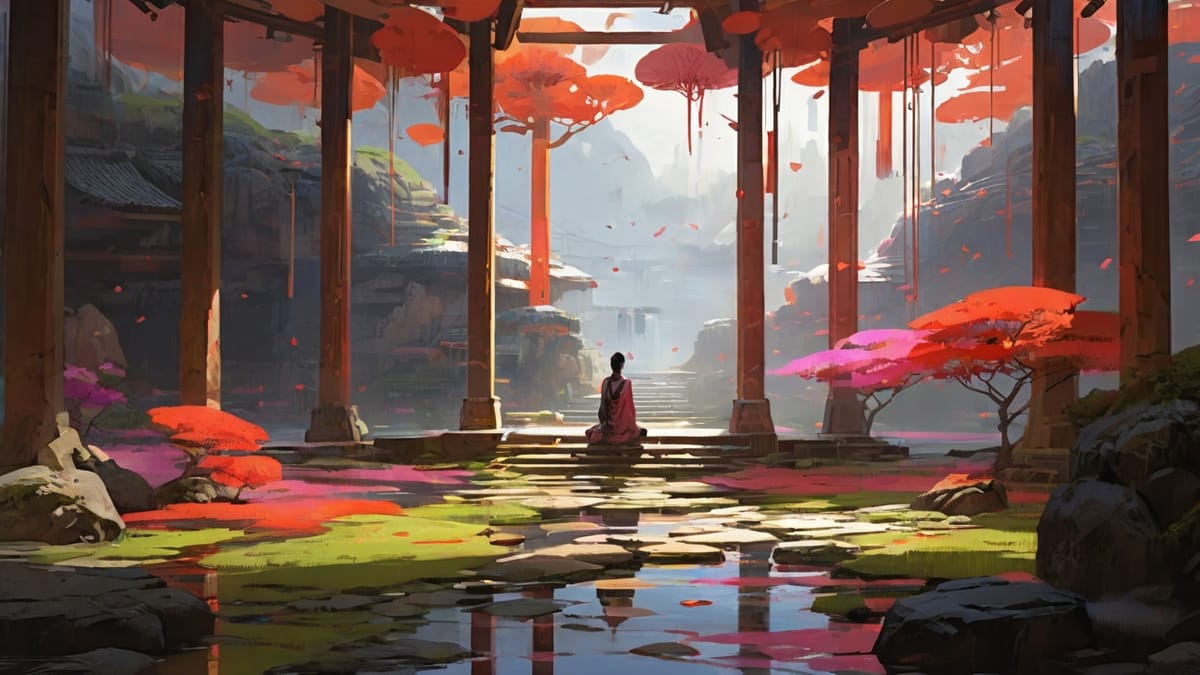A hard pill to swallow for Westerners
In the West, we often think of happiness as a feeling that comes from without. We believe that if we can just find the right job, make more money, or find the perfect partner, we’ll finally be happy. Forever.
But according to Eastern philosophy, true happiness comes from within.
It’s not about what you have but about how you see the world and your place in it. One of the best things about Eastern philosophy is that it can help us find happiness in even the most difficult situations. By accepting life’s hardships as a part of the human experience, we can learn to find joy amid suffering.
In this article, we will explore some of the key concepts of happiness in Eastern culture and how they can help us find true happiness in our own lives.
The difference between Eastern and Western conceptions of happiness
Though there is no right or wrong way to achieve happiness, understanding the different conceptions of happiness can help us find what works best for us.
Eastern traditions view happiness in a much different light than Western society. And they have long had different conceptions of happiness. In Eastern cultures, happiness is often a state of harmony and balance. In the West, it is more commonly associated with positive emotions and pleasurable experiences.
Westerners are more likely to focus on external aspects such as material possessions, success, or acquiring power. But Eastern traditions emphasize more internal factors, such as inner peace and contentment, instead of chasing after the superficial.
Western cultures are more likely to pursue happiness through achievements and accomplishments. But Eastern traditions tell us that contentment needs us to master the instrument through which we view the world. Namely, our minds. As a result, Easterners are more likely to seek happiness through activities such as meditation and self-reflection.
Eastern philosophies, such as Buddhism and Daoism, focus on Buddha-nature and the Dao. These Eastern concepts emphasize that all beings have the potential to achieve enlightenment and obtain true happiness. Eastern philosophies also highlight how meaningful living in harmony with others and nature is. The Western view of happiness, however, often focuses on individualism and materialism.
Including the spiritual and emotional aspects of life, the Eastern view of happiness is more holistic. And the Western perspective is more materialistic, focusing on tangible measures of happiness such as income and possessions.
All in all, Eastern philosophers believe true happiness comes from within oneself and from being in harmony with the world around them. Not from external factors like wealth or success. This can be a difficult pill for many Westerners to swallow, as we are conditioned to believe that achieving our goals will make us happy. Eastern philosophy challenges us to re-examine our assumptions about what truly leads to a fulfilled life.
But even though Eastern philosophies focus on internal factors, that doesn’t mean they are necessarily against material possessions. It’s about balance and not attaching your own happiness to external factors.
What is happiness according to Eastern philosophy?
Eastern philosophy has a rich history, dating back thousands of years, thinking about happiness. Eastern philosophers have traditionally focused on the search for spiritual enlightenment. As a result, they emphasize the importance of inner peace and balance as essential ingredients for a happy life. Consequently, Eastern philosophy offers a different perspective on happiness than what we typically know in the West.
Laozi and Zhuangzi, for example, both believed that happiness comes from living in harmony with the Dao, or the natural order of things.
For many Eastern philosophers, happiness is not simply a state of mind but a way of being. It is about living in harmony with the world around us and being at peace with ourselves. Eastern philosophies stress the importance of balance both within ourselves and our relationships with others. They say we need to learn to find the middle ground between extremes. When we can do this, we can achieve a state of equilibrium that is both mentally and physically healthy.
Buddhism teaches that the key to happiness lies in living in the present moment, letting go of attachments, and focusing on our inner journey instead of chasing after external goals. If we do this, we can learn to appreciate the simple things in life and find true happiness from within.
We can achieve this through meditation and mindfulness, which help to quiet the chatter of the mind and allow us to focus on the present moment.
By taking a more holistic approach to happiness, Eastern philosophies offer a well-rounded path to lasting contentment.

What are common misconceptions about happiness in Eastern philosophy?
The West often misunderstands Eastern philosophy.
One of the most common misconceptions is that it is all about happiness. While it is true that Eastern philosophers place a great deal of emphasis on living a joyful life, happiness is not the only goal. They also believe in the importance of striving for personal growth and self-improvement. That means there will be times when we experience negative emotions such as sadness and anger. These emotions are necessary stepping stones on the path to wisdom and enlightenment.
Eastern philosophy also typically stresses the importance of balance and moderation in all things. Including happiness. That can be challenging for Westerners to understand because we often equate happiness only with positive emotions like elation and joy.
That doesn’t mean that people living after the concepts of Eastern philosophy never experience negative emotions. Here, it’s also about learning to accept life’s ups and downs without letting them derail your emotional well-being.
In addition, Eastern philosophy does not focus solely on individual happiness. It also emphasizes the importance of community and interdependence. That can be another foreign concept for individualistic Westerners. Eastern cultures often see happiness as something you must share with others to be fully realized.
As you see, you must have an open mind to not fall into the traps of Western thinking. Otherwise, it will be hard to understand the real meaning behind the Eastern concept of happiness.
What is the relationship between happiness and suffering in Eastern philosophy?
Eastern philosophy often sees happiness and suffering as two sides of the same coin. Suffering is an inescapable part of life, but it is also what gives life meaning and purpose. Without experiencing difficult times, we would never appreciate the good moments. Suffering can also be an opportunity for growth and transformation. Because it is through our sufferings that we learn, grow, and develop compassion and wisdom.
It seems suffering can even be a source of happiness. However, this doesn’t mean that suffering is a good thing in itself or that we should actively seek it out. But we should accept it as a natural part of life.
Happiness, then, is not about avoiding suffering but about viewing it as a natural part of life, learning from it, and using it to become a better person.
In Buddhism, for example, the First Noble Truth is that life is suffering. That doesn’t mean life is always unpleasant but full of change and impermanence. Everything is constantly in flux, and nothing lasts forever. This can be tough to understand for Westerners because we are used to thinking about happiness as a constant state we can achieve.
It is important to remember that even though Eastern philosophy does not shy away from the realities of suffering, it emphasizes the importance of living a joyful life.
That means finding ways to value the good moments and make the most of them. It is only through experiencing both happiness and suffering that we can truly appreciate the value of life.
What are the challenges of living a happy life according to Eastern philosophy, and how to overcome them?
While the challenges of living a happy life may vary according to each individual, Eastern philosophy typically identifies three main obstacles: attachment, aversion, and ignorance.
Attachment is the attachment to things that we perceive as pleasurable, such as material possessions, power, and status.
Aversion is the avoidance of things that we perceive as unpleasant, such as pain, discomfort, and loss.
Ignorance is the lack of knowledge or understanding about the nature of reality.
Every obstacle can lead us away from happiness and prevent us from living in harmony with others and the world around us.
To overcome these challenges Eastern philosophy encourages us to practice detachment, altruism, and mindfulness. By learning to let go of our attachments and aversions, we can open ourselves to new possibilities and experiences. And by cultivating mindfulness, we can develop a greater understanding of ourselves and the world around us.
So, how can Eastern philosophy help me find true happiness?
Lasting happiness is something that everyone seeks but few find. We often look to external factors, such as wealth or success, hoping they will bring us contentment. However, this view is often found wanting, as many people who have all of these things are still unhappy.
Yes, these things may provide temporary satisfaction, but they can’t give us lasting happiness.
Eastern philosophy offers a different path to happiness. One that begins with the understanding that true happiness comes from within. By becoming more aware of our thoughts and emotions, we can learn to control them instead of being controlled by them. This inner peace then allows us to find joy in simple things and appreciate the present moment.

As a result, we are less likely to chase after fleeting pleasures and more likely to experience true and lasting happiness.
Eastern philosophy teaches us that happiness is not a destination that we can reach by accumulating more things.
Instead, it’s a state of mind that comes from accepting life as it is and learning to find contentment in every moment. This doesn’t mean that we should never strive to improve our lives. But it does imply that we should focus on the journey, not the destination.
That is what it means when you hear Eastern monks in movies say: “If you are seeking true happiness, look within yourself.”
Even if you don’t have all the things you want in life, you can still be happy as long as you have a positive outlook and focus on the good in your life. While it may not be easy to adopt this mindset, doing so can help you find true happiness.
As Laozi says:
“A journey of a thousand miles begins with a single step.”







Comments ()